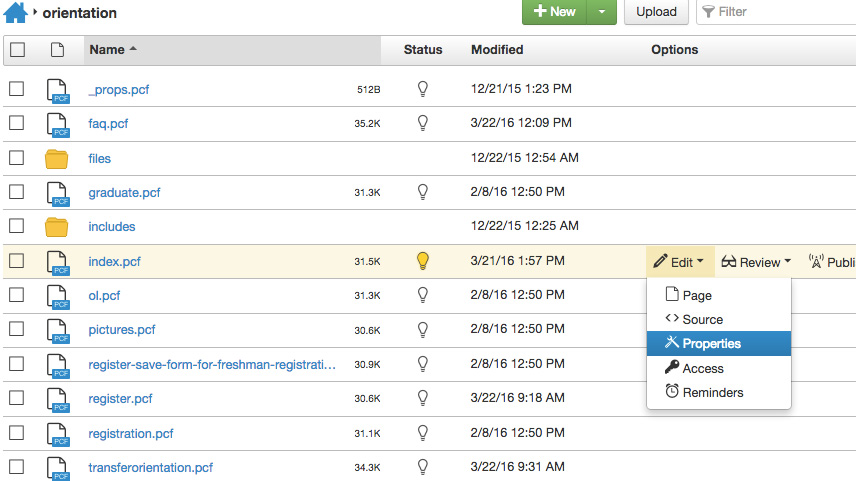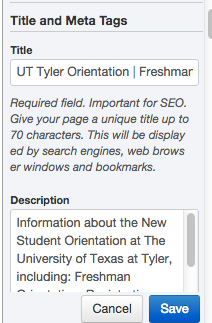Metadata, Title & Description Tags, SEO
Contact Us
Marketing and Communications
3900 University Blvd.
Tyler, TX 75799
800 UT TYLER
Ph: 903.566.7170
Fx: 903.566.7173
web@uttyler.edu
OU Campus Training and Standards
Metadata: Title Tags, Description Tags and Search Engine Optimization (SEO)
If done correctly, meta tags can play an important roll in how the website performs in search engines.
Title Tags
- The title tag is located in the metadata and is required for all HTML/XHTML documents.
- Keep your page title tag around 70-75 characters. Building a title tag that is too long can be considered SPAM by Google and can alter your search engine ranking.
- Display the correct title tag on each page.
- Write descriptive, unique title tags for EACH page.
- Keywords from page content should be used in your title tag.
- Avoid duplicate meta title tags.
Description Tags
- If your webpage were a commercial, this would be where the slogan is located.
- A good meta description should have well-written unique content.
- Avoid duplicate meta description tags.
Editing Title and Description
When you are in the JustEdit page editor, make sure you have the page checked out (by selecting the yellow lightbulb). Then select "Properties".

You are now in the Page Parameters section of your webpage. Scroll past the "Title
and Meta Tags" to "Page Headings". This is where you edit the page heading and subheading.
Typically, the page information is the top Page Heading, and the department name is
the :age Subheading. Check your department site headings for consistency.
Once you have made your edits, select "Edit" to take you back to the JustEdit section.
Additional ways to access Page Parameters:
There is several ways to access the Page Parameters.
- When you are in the JustEdit page editor, make sure you have the page checked out (by selecting the yellow lightbulb). Then select "Properties".
- Another way to access Page Parameters from the "Content
view. Select "Content" at the top of the page, check in the page, mouse over "Edit", select "Properties".
- Last, you can always access the Page Parameters from within the JustEdit editor. Open
your "Gadgets" button, then select "Page Parameters". You can see each section by
scrolling down.


It is VERY important that you do not go over the number of characters suggested in each section. Google will use these sections for displaying content, and can punish a page if not properly written.
Meta Title
- Each title tag must be unique for the content on the page. Using duplicate title tags will cause ranking issues with your page.
- Keep title tags around 75 characters.
- Make title tags concise and informative for the user and the search engine using individual keywords from the content on the page.
- Avoid repeating keywords in the title tag.
Meta Description
- Each meta description must be unique for the content on the page. Using duplicate metadata will cause search engines to view the page as SPAM and will effect your page ranking.
- Keep descriptions around 150 characters.
- Make them compelling, concise and informative.
- Remember, this is the advertisement for your page on Google.
- Utilize keywords from the content on the page. Avoid repeating keywords.
Think of your meta title tag and description as the description you read on the inside cover or back of a book. When informative and compelling, users will click through to your content.
For updating your pages with accurate metadata, contact the UT Tyler Web Team.
For additional information, see OU Campus Properties documentation.
- Complete Online Help Files
- Best Practices
- Gadgets
- Left-Side Navigation
- Logging in / Out
- Writing for the Web
- Complete Downloadable Reference Guides
- Submit a Support Ticket
- Web Publishing Standards, Style Guide and Guidelines
Additional information
Contact Us
Marketing and Communications
3900 University Blvd.
Tyler, TX 75799
800 UT TYLER
Ph: 903.566.7170
Fx: 903.566.7173
web@uttyler.edu